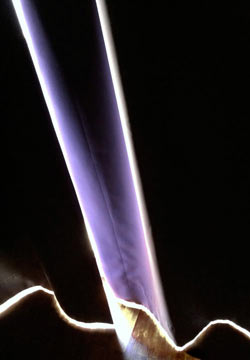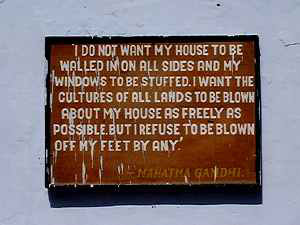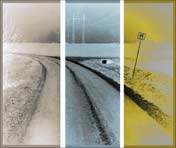NONVIOLENCE
Nonviolence = peace by peaceful means
To promote peace by peaceful means, thereby contributing to help abolish war as a socially accepted institution - that's what TFF strives for. This position is both in line with the UN Charter and the pro-peace policy the Foundation has chosen to emphasize as it's raison d'etre and put particular emphasis on since early 2012.
Peace by peaceful means is realism, not utopianism. We do not see M.K. Gandhi, Ghaffar Khan, Martin Luther King, Jr., etc. as figures in a museum. Their constructive, pro-peace ideas and methods must be adapted and applied to the problems of the contemporary world.

the dark curtain of violence and helps us see
This theme goes through all TFF Associates' articles, analyses and reports. They highlight the contemporary relevance of nonviolence. They contain philosophical, conceptual and historical aspects of nonviolence and the role of leading proponents, activists and theoreticians in the field, M.K. Gandhi in particular.
Since the 1940s, the world has witnessed a de facto increase in nonviolent change e.g. in India, Philippines, Iran, Poland, Czechoslovakia, the former Soviet Union, Serbia, Georgia as well as in Tunisia and Egypt in 2011.
In addition, we can point to the rapid growth of peaceful social change movements - such as those in support of the environment, women, peace, human rights and alternative economics, as indicators of how powerful nonviolence can be.
Mainstream media, education and political discourse very seldom focus on the nonviolence within these huge change movements. While wars often hit the front pages, there were, for example - hardly any major headlines in 1989 stating the obvious: Thanks to nonviolence and citizens, peaceful demonstrations, the Cold War that threatened to erupt into a Third World War (in which nuclear weapons could have been used) was avoided.
While nonviolence generally opens doors to a better future, wars and other types of violence tend to close them. It is certainly questionable whether the wars in and on Somalia, Afghanistan, Iraq, Libya, etc. have opened doors to a better, more peaceful and democratic future for the peoples of those countries.
It is the ethical norm in the health and medical profession to save lives and cause as little harm as possible when healing a patient. One wonders why, therefore, in the field of politics, it is still all too often considered "necessary" or "acceptable" to create extensive death and suffering through violent interventions.
One answer may be that MIMAC, the Military-Industrial-Media-Academic Complex that survives in the shadow of democratic decision-making, still knows how to manipulate so as to secure its vested interests.
There are numerous articles with a focus on this theme in the archives in the right-hand column. Please also take a look at the links to your right as well as the articles on the TFF Associates & Themes blog in the top menu.





 Get Free Email Updates
Get Free Email Updates Support this site
Support this site Feedback
Feedback About this website
About this website